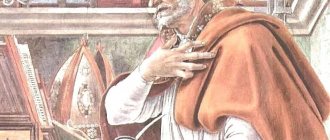Today, the majority of residents of Ukraine, Russia, and Belarus call themselves Orthodox. But the very fact of a person’s baptism in the Orthodox faith does not make him Orthodox finally and irrevocably. And it certainly does not guarantee his salvation. What makes us Orthodox?
At least two things depend on us in this matter. First, we must believe and glorify God correctly, that is, exactly as Jesus Christ Himself commanded us, the apostles conveyed it, and the saints and prophets explained and clarified it. Otherwise we cannot call ourselves Orthodox. Secondly, according to our faith, we must do good deeds for the glory of God, for in order to be called sons of God we are obliged to do the deeds of Him whom we call our Father.
If we somehow manage to get away with the second, then the first and most important of these two conditions is, alas, not always met. Partly, this state of affairs has developed because we came to the Church quite recently after many years of persecution, when the correct understanding of the faith was not passed on from generation to generation. In part, this is due to the lack of missionary, educational, and catechetical practice in educational institutions and parishes today. This is where “the sinful and the righteous” are confused in the heads of our Orthodox believers: the foundations of Orthodox dogma peacefully coexist with superstitions, paganism and other esotericism.
Meanwhile, only he can rightfully call himself Orthodox who knows exactly why he was baptized, why he remains in the bosom of the Church and what the Holy Church believes in.
The famous Orthodox preacher, Priest Daniil Sysoev, in his wonderful book “Catechetical Conversations,” gives an example of a test of faith that back in the 19th century all catechumens had to undergo. If a person’s views differed in any way from the correct understanding of the fundamentals of faith, then he was not allowed to participate in the sacrament of baptism.
I think that every Orthodox Christian should constantly have these questions and answers at hand, and they need to check themselves daily so as not to deviate from the right faith. I present below an extract from this invaluable work and hope that this will help many to establish themselves in the correct views of our faith.
Tests Basic Theology and Apologetics
1. Apology is translated as a) explanation b) sermon c) defense
2. Basic theology deals with a) defense and justification of Orthodox doctrine b) presentation of the tenets of faith c) comparative analysis of the teachings of various religions
3. Apologetics refers to theological disciplines a) basic b) introductory c) source studies
The main directions of apologetics do not include a) philosophical b) natural science c) historical d) humanitarian
5. Outstanding ancient apologists include a) Justin the Philosopher b) Basil the Great c) Tertullian d) Osipov e) Pascal
6. The word “religion” is translated as a) connection b) faith c) piety d) love
7. According to atheism, religion is a) union with God b) belief in something higher c) a type of mental illness
8. Religion is a) the creation of man b) the creation of God c) arises from the cooperation of man and God
9. Proofs of the existence of God do not include a) cosmological b) moral c) ontological d) apologetic
10. The human soul a) eternal b) created by God and immortal c) created by God and mortal d) not created by God and temporary
11. Theodicy is a) the doctrine of the justice of God b) about God as the source of evil c) about the justification of God in the face of evil in the world
12. The world a) exists forever b) created by God c) arises by chance on its own
13. The science that studies the Shroud of Turin is a) Turinology b) Sindonology c) Christology
14. Scientific knowledge and Christian theology a) contradict b) complement each other c) do not contradict each other
15. God a) completely knowable b) completely unknowable c) partially knowable by energy
16. To know God means a) read about Him in a theology textbook b) learn the creed c) unite with Him by faith and love in the Church d) talk with the elders
17. The most obvious indication of the existence of God in man is a) body b) will c) conscience
18. The problem of theodicy was dealt with by the German philosopher a) Kant b) Fichte c) Leibniz
19. He considered all the proofs of the existence of God to be unfounded a) Hegel b) Schelling c) Kant
20. Those who believe that the existence of God can neither be proven nor disproved are a) atheists b) believers c) agnostics d) nontheists.
21. Those who believe that God does not interfere in the existence of the world and man after their creation are a) deists b) theists c) pantheists.
22. The doctrine of the uselessness of God for the world and man is a) nontheism b) anthropomorphism c) skepticism
23. The historical existence of Christ from a scientific point of view. is a) doubtful b) fully proven c) false
24. There are a) 33 b) 60 c) 77 Old Testament prophecies about Christ.
25. The books of the New Testament were written a) 2nd century. b) 3 c. c) Tue. floor. 1st century AD
26. The most convincing “material evidence” of the historical existence of Christ as the God-man is a) the Holy Sepulcher b) the Shroud of Turin c) the Crown of Thorns
27. Is knowledge of Orthodox doctrine necessary for salvation? a) necessary b) not necessary b) indifferent
28. Religion a) has always been and will be b) appears at a certain stage in human history c) will soon disappear
29. The main problem that any religion tries to solve is a) the problem of poverty b) the problem of death and the meaning of life c) the problem of social justice
30. Truth can be found in a) philosophy b) science c) all religions d) Orthodoxy
31. Christianity differs from all other religions in that the main place is given to a) faith b) fear c) love d) piety
32. Orthodoxy differs from other directions of Christianity in its teaching and practice of a) salvation b) deification c) redemption d) enlightenment
33. A way of life based on faith in the Revelation of God is a) morality b) politics c) theology d) philosophy
34. “God exists, because in our mind there is a concept of God as an all-perfect being” - this is evidence a) historical b) ontological c) moral d) cosmological
Orthodox tests for women. Theological educational tests
My result: Orthodox with experience.
You have been in the Orthodox Church for ten or twenty years, so nothing will surprise you. You saw with your own eyes that the system is far from perfect, and you became disillusioned with Orthodoxy as a whole. Sometimes you openly criticize shortcomings and problems that you notice. However, a skeptical attitude does not prevent you from going to church services. How did you last so long?
The answer is not true. I AM NOT DISAPPOINTED in Orthodoxy - neither “in general” nor in any other way.
this is great! Congratulations






